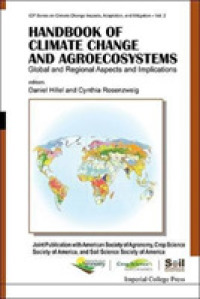- ホーム
- > 洋書
- > 英文書
- > Nature / Ecology
Full Description
As water scarcities increase, nations throughout the world are in search of better institutions to manage water resources. India has been making substantial efforts to develop its water management systems since independence and significant increases in irrigated agriculture have taken place through both public and private initiatives. However, scarcities are increasing and major problems presently confront the management of water resources and irrigated agriculture. Resolving these problems is crucial for the future.
The main purpose of this book is to provide a new approach for the analysis and design of water institutions that govern the use and development of water resources, particularly for agriculture which is the largest user. Drawing on the theory of New Institutional Economics and comparisons with Australia (as a developed country) and other less developed nations in Africa and Asia, the authors present original empirical data from three Indian states. Detailed analysis of these data is used to identify and recommend attributes and features of water management institutions that are conducive to effective resource management, its long-term success, and its best contribution to development.
Contents
1. The Effectiveness of Water Institutions.
2. Laws, Customs and Rules: Identifying the Characteristics of Successful Water Institutions.
3. Dynamic Community Preferences: Lessons for Institutional Design and Measuring Transaction and Transformation Costs.
4. Institutional Constraints and Organisational Dynamics: The Case of Water Trade between the Australian Capital Territory and New South Wales.
5. Institutions for Water Management in Developing Countries: Their Role, Nature and Analysis.
6. Water Institutions in India: An Institutional Design Perspective.
7. Legal Dimensions of Water Resource Management in India: A Review of Legal Instruments Controlling Extractions to Sustainable Limits.
8. Water Resource Development and Institutions in India: Overview and Profile.
9. Water Institutions in the States of Andhra Pradesh, Gujarat and Maharashtra in India: An Empirical Study.
10. Surface Water Institutions in India: An Empirical Study.
11. Ground Water Institutions in India: An Empirical Study.
12. Rain Water Harvesting Institutions in India: An Empirical Study.
13. Rights Devolution Under Irrigation Management Transfer in Developing Asia: Theoretical Considerations and Empirical Results.
14. The Role of Information and Decision Making Capacity in a Hierarchal Process.
15. Water Institutions and their Relationship to Poverty Alleviation.
16. Institutions and Irrigation in India - Concluding Lessons and the Way Forward.
Index






